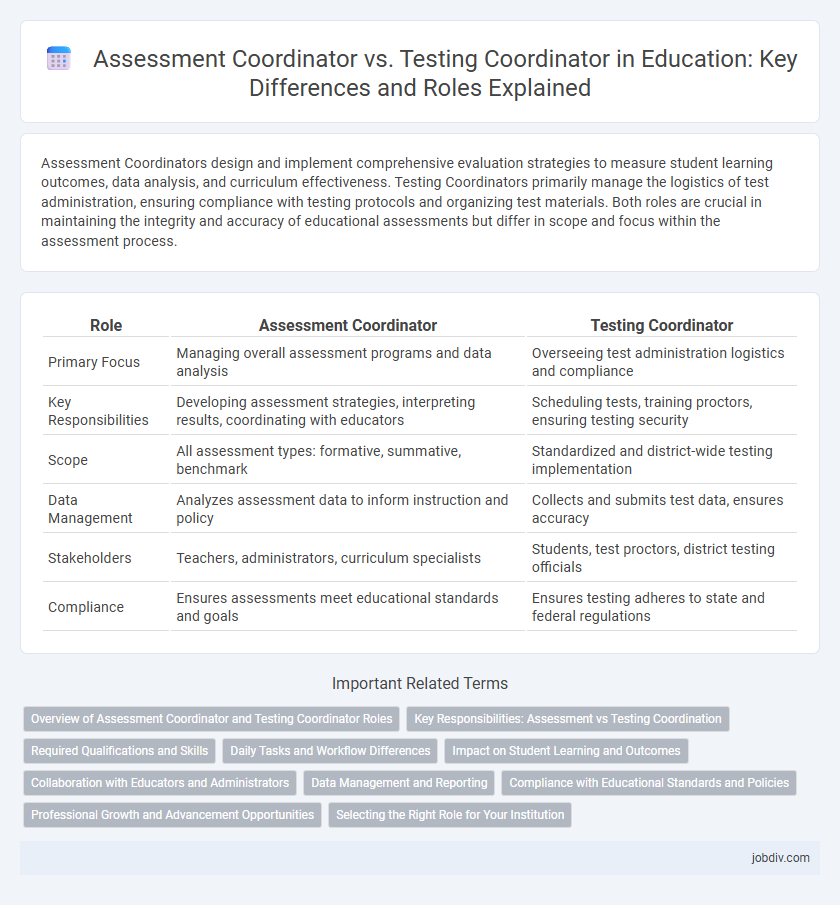Assessment Coordinators design and implement comprehensive evaluation strategies to measure student learning outcomes, data analysis, and curriculum effectiveness. Testing Coordinators primarily manage the logistics of test administration, ensuring compliance with testing protocols and organizing test materials. Both roles are crucial in maintaining the integrity and accuracy of educational assessments but differ in scope and focus within the assessment process.
Table of Comparison
| Role | Assessment Coordinator | Testing Coordinator |
|---|---|---|
| Primary Focus | Managing overall assessment programs and data analysis | Overseeing test administration logistics and compliance |
| Key Responsibilities | Developing assessment strategies, interpreting results, coordinating with educators | Scheduling tests, training proctors, ensuring testing security |
| Scope | All assessment types: formative, summative, benchmark | Standardized and district-wide testing implementation |
| Data Management | Analyzes assessment data to inform instruction and policy | Collects and submits test data, ensures accuracy |
| Stakeholders | Teachers, administrators, curriculum specialists | Students, test proctors, district testing officials |
| Compliance | Ensures assessments meet educational standards and goals | Ensures testing adheres to state and federal regulations |
Overview of Assessment Coordinator and Testing Coordinator Roles
Assessment Coordinators oversee the development, implementation, and analysis of student evaluations to ensure alignment with curriculum standards and improve instructional strategies. Testing Coordinators manage the logistics of standardized testing, including scheduling, compliance with testing regulations, and ensuring test security. Both roles collaborate to enhance assessment accuracy and support data-driven decision-making within educational institutions.
Key Responsibilities: Assessment vs Testing Coordination
Assessment Coordinators oversee the development, implementation, and analysis of educational assessments to ensure alignment with curriculum standards and improve student learning outcomes. Testing Coordinators manage the logistical aspects of standardized test administration, including scheduling, compliance with testing protocols, and secure handling of test materials. The key distinction lies in Assessment Coordinators focusing on the design and interpretation of assessments, while Testing Coordinators emphasize operational efficiency and adherence to testing regulations.
Required Qualifications and Skills
Assessment Coordinators typically require a background in educational measurement or psychometrics, strong analytical skills, and proficiency in data interpretation to oversee assessment design and implementation. Testing Coordinators need expertise in standardized testing procedures, logistics management, and compliance with testing regulations to ensure smooth administration of exams. Both roles demand excellent communication skills, attention to detail, and the ability to collaborate with educators and administrators effectively.
Daily Tasks and Workflow Differences
Assessment Coordinators manage the design, implementation, and analysis of educational assessments, ensuring alignment with curriculum standards and compliance with testing regulations. Testing Coordinators focus on scheduling, administering, and supervising standardized testing sessions, including logistics such as materials distribution and proctor training. The workflow of Assessment Coordinators involves data interpretation and reporting, while Testing Coordinators prioritize operational execution and troubleshooting during test administration.
Impact on Student Learning and Outcomes
Assessment Coordinators design and implement comprehensive evaluation systems that align with curriculum standards, directly influencing instructional strategies and improving student learning outcomes. Testing Coordinators manage the logistics of standardized test administration, ensuring compliance with testing protocols and data accuracy, which supports valid measurement of student achievement. Efficient collaboration between both roles is essential to optimize the impact on student performance and inform data-driven decision-making in educational settings.
Collaboration with Educators and Administrators
Assessment Coordinators collaborate closely with educators and administrators to design, implement, and analyze comprehensive evaluation strategies that align with curriculum standards and school goals. Testing Coordinators work alongside these stakeholders to manage the logistics of test administration, ensuring compliance with testing protocols and minimizing disruptions to instructional time. Both roles require effective communication and teamwork to enhance student performance and maintain assessment integrity across educational settings.
Data Management and Reporting
Assessment Coordinators oversee data management systems, ensuring accurate collection, analysis, and secure storage of student performance data to support instructional decisions. Testing Coordinators focus on organizing test administration logistics, maintaining test integrity, and promptly reporting standardized test results to stakeholders. Efficient collaboration between both roles enhances data accuracy, timely reporting, and compliance with educational policies.
Compliance with Educational Standards and Policies
Assessment Coordinators ensure compliance with educational standards by designing and implementing assessments aligned with curriculum guidelines and state mandates. Testing Coordinators focus on adhering to testing policies, managing test administration procedures, and maintaining secure testing environments to meet federal and state regulations. Both roles collaborate to guarantee that assessment practices uphold institutional accountability and legal requirements in education.
Professional Growth and Advancement Opportunities
Assessment Coordinators specialize in designing and managing comprehensive evaluation systems, enhancing their expertise in data analysis, curriculum alignment, and instructional improvement, which positions them for leadership roles in academic administration. Testing Coordinators focus on the logistics and administration of standardized testing, developing skills in compliance, test security, and operational coordination, often leading to career advancement in assessment management and educational policy implementation. Both roles offer distinct professional growth pathways, with Assessment Coordinators advancing towards curriculum development and educational strategy, while Testing Coordinators move into specialized testing program management and regulatory compliance positions.
Selecting the Right Role for Your Institution
Assessment Coordinators oversee the design, implementation, and analysis of academic evaluations to ensure alignment with curriculum standards and improve student learning outcomes. Testing Coordinators focus on managing standardized test administration logistics, maintaining testing security, and coordinating schedules across classrooms and testing sites. Choosing the right role depends on whether your institution prioritizes comprehensive assessment strategy development or efficient, compliant standardized test operations.
Assessment Coordinator vs Testing Coordinator Infographic

 jobdiv.com
jobdiv.com